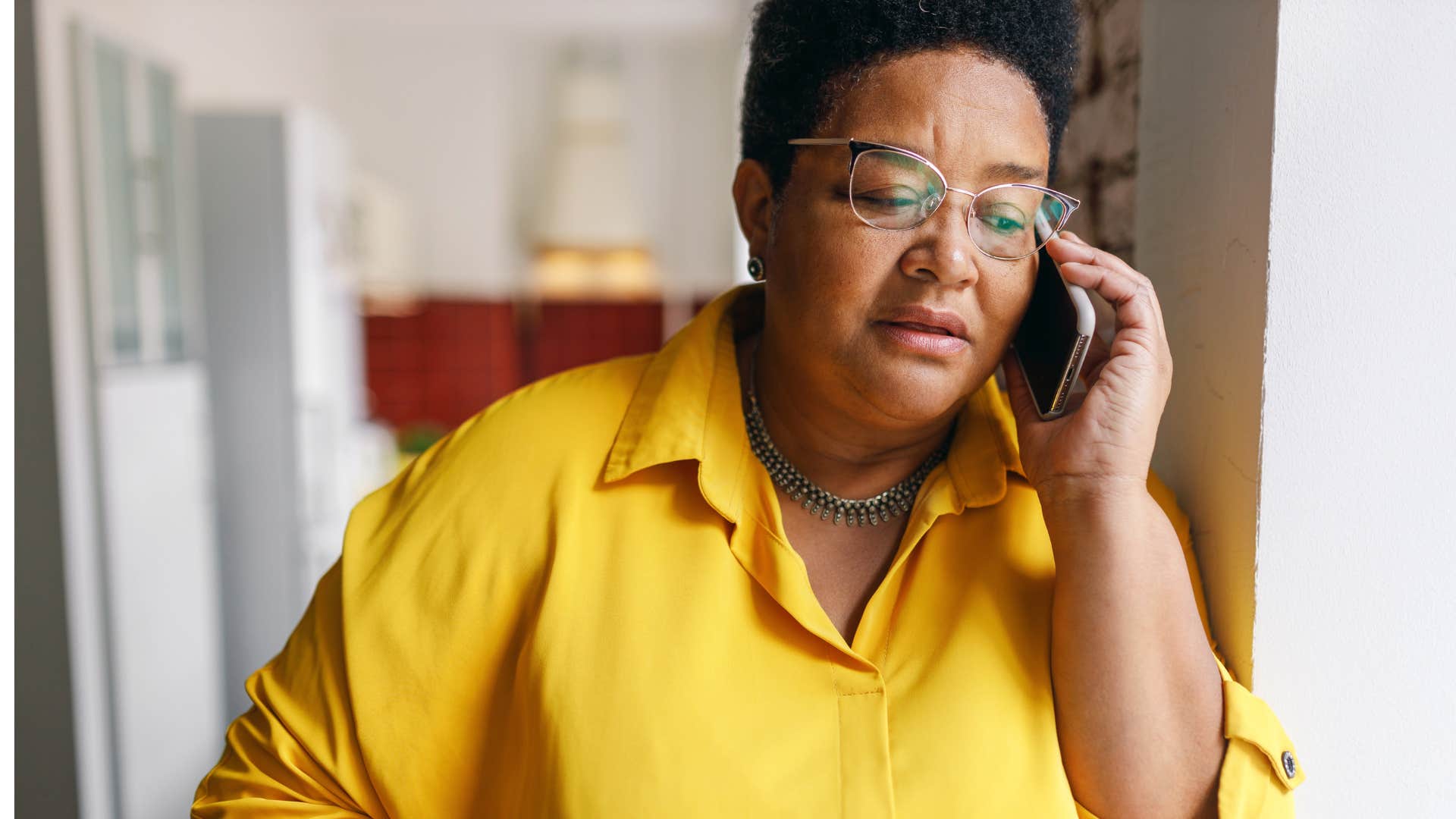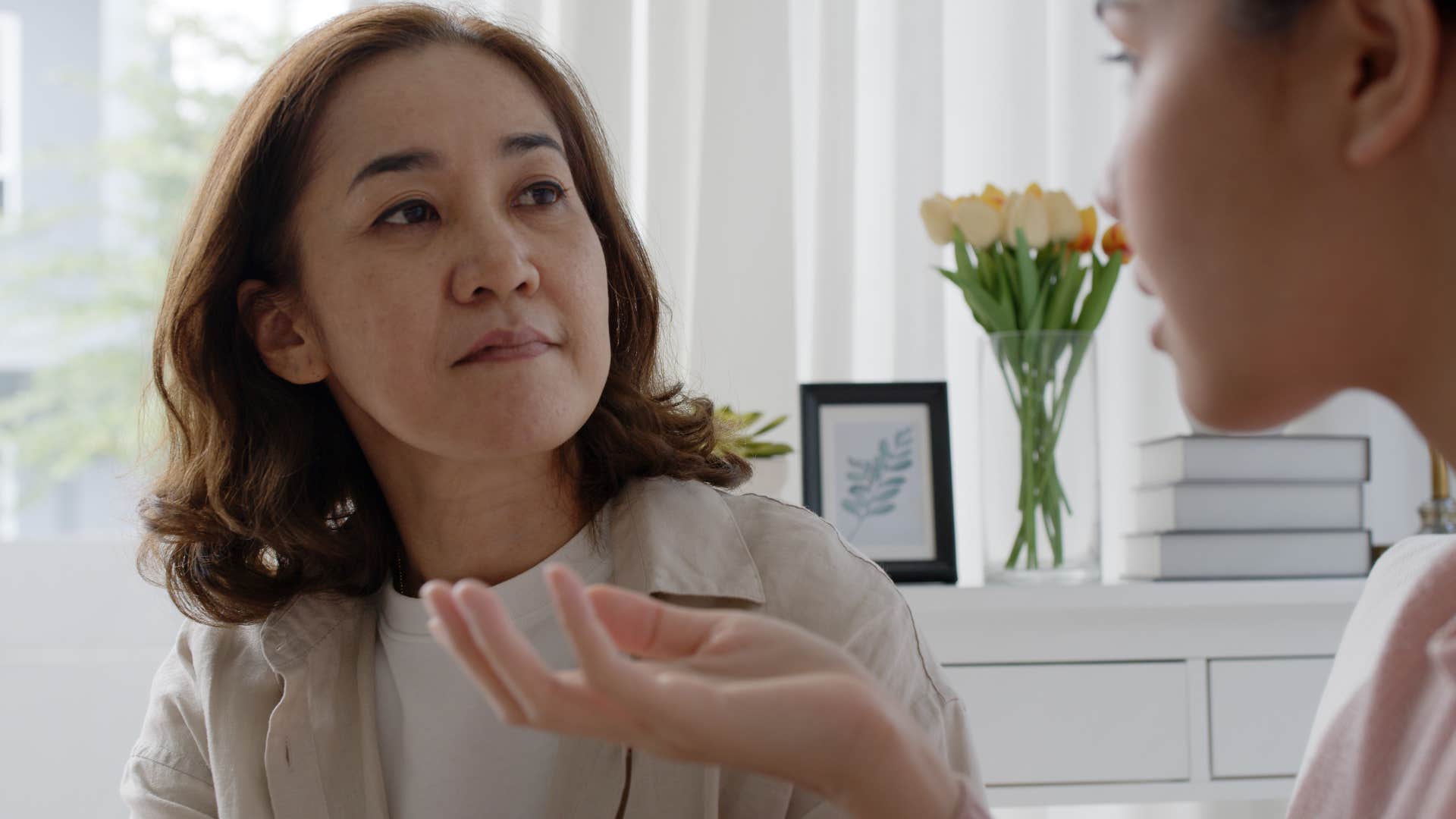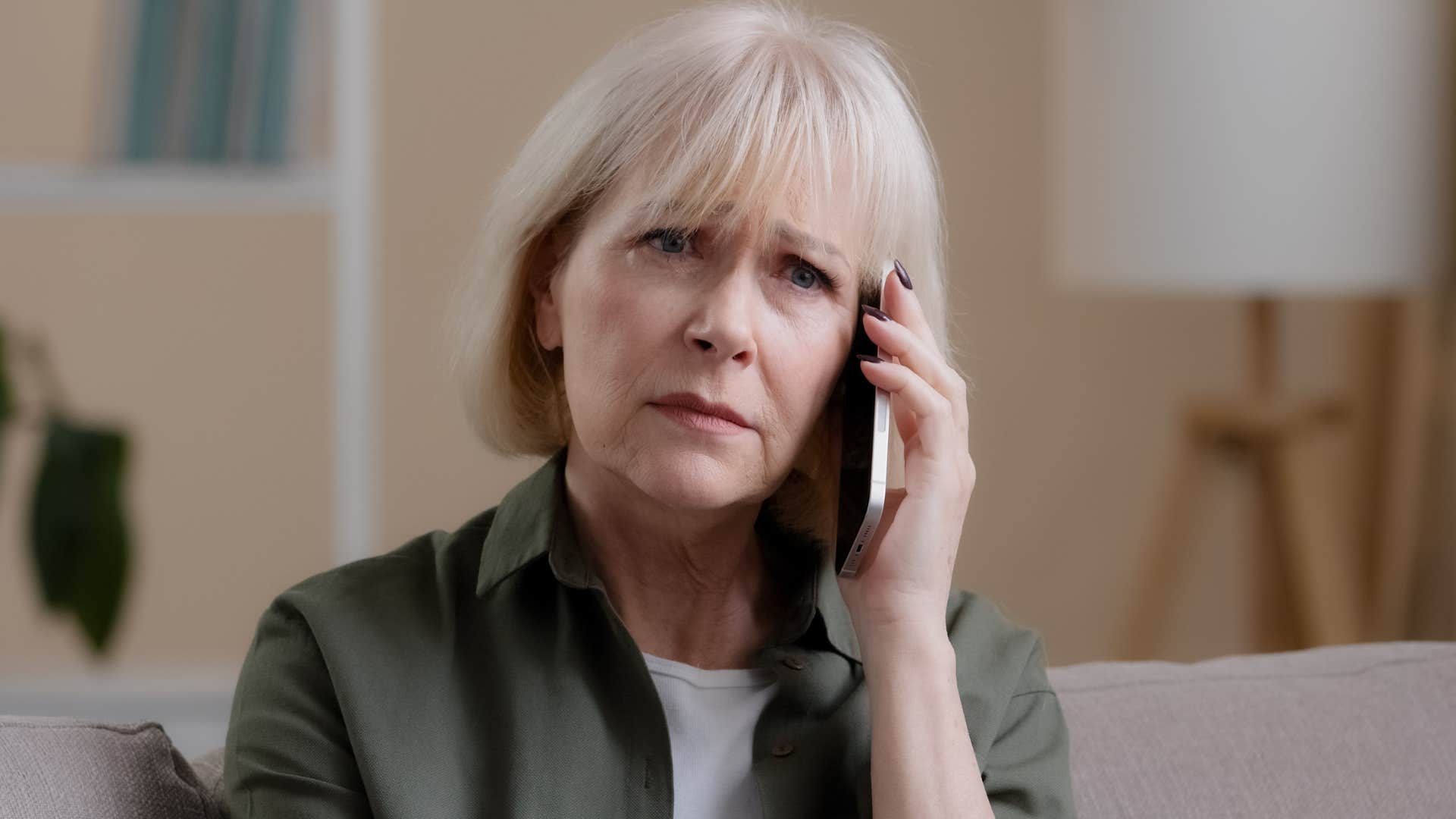If Your Parents Complain About These 11 Things, They're Lonelier Than They Want You To Know
They're afraid of burdening their kids with their own basic needs.
 Gladskikh Tatiana | Shutterstock
Gladskikh Tatiana | Shutterstock While some “empty nester” parents tend to appreciate the time and space that adult children moving out offers, a study from Communications Psychology found that for others, it’s loneliness and fatigue that replace their kids’ presence at home. From struggling to cope with the natural disconnect that comes with adult children growing up to missing the sense of stability and role at home, it’s not uncommon for parents to struggle with loneliness later in life without their kids around all the time.
If you’re an adult child living your own life and managing your own responsibilities, recognizing when your parents are struggling can be hard — especially if you’re not together in person. Luckily, even a phone conversation and specific phrases like “I miss you guys” can be a sign they need support. So, if your parents complain about these things, they’re lonelier than they want you to know.
If your parents complain about these 11 things, they’re lonelier than they want you to know
1. ‘Everyone’s so busy nowadays’
 fizkes | Shutterstock
fizkes | Shutterstock
When your kids grow up and leave home, they start to manage their lives and take on new responsibilities. Now, they have careers, families of their own, and plans for the future that take up a lot of time. But nurturing family relationships and healthy connections with their parents should still be a priority, even if quality time looks different from what it did as a kid.
Like a study published in Innovation and Aging explains, family relationships play a large role in protecting and safeguarding our emotional and general well-being. The more time, effort, and care we put into helping our parents feel loved and cared for, the better off we are in every aspect of our lives.
So, if your parents complain about everyone being busy all the time or not having anyone to talk to, they’re lonelier than they want you to know — and it’s time to reach out and start prioritizing their well-being more often.
2. ‘You’ve got a lot going on’
 Bricolage | Shutterstock
Bricolage | Shutterstock
Even if it means minimizing their own emotions and feelings for the comfort of their adult children, a parent who’s experiencing loneliness may complain about being alone, only to follow it up with a phrase like, “But I know you’ve got a lot going on.” They justify their loneliness and find ways to protect their kids from feeling guilty, even if their needs continue to go unmet.
Of course, guilt-tripping kids into spending time with you as a parent does have many long-term consequences, but asking for time together and needing quality time isn’t a bad thing. If you’re an adult child, prioritize seeing and talking to your parents, even if that means scheduling a 5-minute interval at the end of the week to chat on the phone.
And if you’re a parent struggling with loneliness and social isolation, be willing to practice asking for what you need. Don’t minimize your own struggles and try to protect your kids from your hurt — they’re adults who can handle being asked for quality time.
3. ‘The house is so quiet’
 shurkin_son | Shutterstock
shurkin_son | Shutterstock
If your parents complain about the house being “so quiet” or not having anyone around to talk to, chances are they’re lonelier than they want you to know.
That’s part of the reason why so many aging adults struggling with loneliness use passive TV watching and background noise to cope, like a study from The Gerontologist suggests. Even if nobody else is at home, spending time with them, leaving a TV on in another room, or leaving the lights on at night feels like a subtle way to cope in the moment.
4. ‘All my friends are gone’
 fizkes | Shutterstock
fizkes | Shutterstock
According to a survey conducted by Talker Research, it’s much harder to make friends later in life, when everyone seems to have solid friend groups and a million adult responsibilities to tend to. Especially as “third places” for connection are slowly becoming inaccessible, it’s not surprising that struggling to make and find friends is becoming a bigger problem for everyone.
If your parents complain about their friends being gone or away, they’re lonelier than they want you to know. They may not make a big deal out of it, but the lack of friendships in their lives is actually playing a huge role in their well-being and health.
5. ‘You didn’t answer my call yesterday’
 pixelheadphoto digitalskillet | Shutterstock
pixelheadphoto digitalskillet | Shutterstock
For many older adults and aging populations, the accessibility of connection on their cell phones is a huge relief for feelings of social isolation and loneliness. Like a study from the American Medical Association explains, regular empathetic phone calls actually reduce the risk for depression and feelings of loneliness in these older demographics.
So, if your parents complain about you “missing their call” or “not picking up the phone,” chances are they’re lonelier than they want you to know. They’re either worried about you or they’re struggling to find other ways to cope with loneliness that don’t revolve around their homes.
6. ‘People don’t value family the same way anymore’
 Chay_Tee | Shutterstock
Chay_Tee | Shutterstock
For many older generations and different cultures in the U.S., the lack of family values or prioritization later in life can be an uncomfortable realization. When they grew up, they spent most of their time with their parents, with many living in multi-generational households until they were late in life.
For a multitude of reasons, many younger generations report a lack of strong family ties with their parents, which is part of the reason for this cultural and social shift. So, it’s not uncommon for parents to complain about the lack of quality time or togetherness with their families, but it could also be a sign that they’re lonelier than they want anyone to know.
7. ‘No one tells me anything anymore’
 fizkes | Shutterstock
fizkes | Shutterstock
Feeling left out, misunderstood, or isolated all contribute to feelings of loneliness, even if a person is surrounded by a group of people at a family gathering or an office at work. Feeling misunderstood or unheard is a powerful emotion, like a study from the Journal of Social and Personal Relationships suggests, that can often feed into more emotional and physical turmoil than we recognize.
So, if your parents complain about these things often, they’re probably lonelier than they want you to know. They not only want to spend time with you and your family as an adult child, but they also want to feel appreciated, valued, and seen when you’re around.
8. ‘I didn’t want to bother you’
 Krakenimages.com | Shutterstock
Krakenimages.com | Shutterstock
Minimizing their own feelings to protect their kids’ sanity and comfort is a common behavior for parents struggling with loneliness. They’ve likely structured their entire parenting identity around protecting you from harm and ensuring that you’re okay, so admitting they’re struggling or asking for help makes them feel personally dysregulated and afraid.
“I didn’t want to bother you” is a common reflection of that sentiment. They’d prefer to bottle everything up inside to “protect” their kids, even if it leads to further separation, disconnection, and social isolation.
9. ‘We don’t have to do anything this year’
 MAYA LAB | Shutterstock
MAYA LAB | Shutterstock
If they know their kids are busy and are actively afraid to ask for the quality time they need, you might hear a phrase like “we don’t have to do anything this year” or “I know you guys are really busy” instead of “I want to spend time together.”
Even if they’re coming across as healthy and happy on the surface, diminishing their desire for quality time on a birthday or for a family gathering for the sake of their kids’ convenience could be a red flag.
10. ‘I’m fine’
 ALPA PROD | Shutterstock
ALPA PROD | Shutterstock
Especially for older generations of parents who don’t have the same openness to discussing mental health as their adult kids or feel uncomfortable being vulnerable later in life, being honest about their struggles with depression or loneliness can feel impossible.
Even if their emotional suppression is subtly harming their health underneath the surface, they often use phrases like “I’m fine” or “don’t worry about me” to cope. So, if you notice your parents complain about these things, they’re lonelier than they want you to know or realize.
11. ‘I never see my grandkids’
 winnievinzence | Shutterstock
winnievinzence | Shutterstock
Even if they’re not actually calling out their own feelings of isolation or loneliness directly, a parent who’s struggling at home may use a phrase like “I never see you” or “I never see my grandkids” to cope. Even if it subtly relies on a bit of guilt-tripping to get their kids to come around, it often offers a fleeting sense of comfort in the moment.
Of course, a strong bond between grandparents and their grandchildren often boosts everyone’s health, so the more time you can prioritize for togetherness, the better everyone will feel on an internal, emotional, and cognitive level, but also on a physical one.
Zayda Slabbekoorn is a senior editorial strategist with a bachelor’s degree in social relations & policy and gender studies who focuses on psychology, relationships, self-help, and human interest stories.

